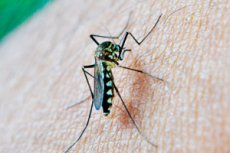New publications
Can the malaria mosquito be neutralized?
Last reviewed: 29.06.2025

All iLive content is medically reviewed or fact checked to ensure as much factual accuracy as possible.
We have strict sourcing guidelines and only link to reputable media sites, academic research institutions and, whenever possible, medically peer reviewed studies. Note that the numbers in parentheses ([1], [2], etc.) are clickable links to these studies.
If you feel that any of our content is inaccurate, out-of-date, or otherwise questionable, please select it and press Ctrl + Enter.

Malaria is a deadly disease transmitted to humans by certain species of mosquitoes. Malaria kills about 500 thousand people on the planet every year. Vaccination against malaria is carried out only in childhood, and the effectiveness and safety of the vaccine is not yet fully understood. Medicines from malaria exist, but they do not guarantee recovery, and resistance to them develops quite quickly.
Scientists are increasingly raising the question of trying to influence not directly the disease, but the mosquitoes that carry the pathogen. Different versions of how to neutralize the infection have already been put forward: for example, introducing a specific anti-plasmodium mutation into the mosquito genome, so that the modified insects would gradually replace the unmodified population in nature. Some experts have suggested involving mosquito symbiont bacteria capable of "expelling" other pathogens from their host. But even here we cannot do without the use of gene modification, and such techniques are quite difficult to integrate. The fact is that genetically modified insects must be released into nature, and it is problematic to solve this issue at the legislative level, as well as to explain the situation to the general public.
And recently, researchers representing various scientific centers in the United States, Britain, Spain and other countries in the course of their work discovered a bacterium capable of preventing the penetration of the malaria pathogen into mosquitoes without any modification. It is about Delftia tsuruhatenskaya strain TC1, living in the intestines of insects. This bacterium can live not only in mosquitoes, but also in bed bugs, as well as in soil and water.
After the mosquito drinks the blood of the carrier of the infection, the pathogen enters the mosquito's intestine, where it matures over a period of time. Only then does the plasmodium enter the insect's salivary system. If, however, the mosquito gut contains the bacterium Delftia zuruhatensis, the plasmodia maturation process is disrupted. As a result, the mosquito becomes less dangerous in terms of malaria, and the risk of further transmission is reduced by about 75%.
Scientists tested the new method first on rodents, then on humans. They managed to find out that the bacterium found in the intestines of insects secretes a specific substance called garman, which prevents the development of malaria plasmodium. By the way, garman is also present in some plants, but this issue is still being studied. It is noteworthy that the bacteria themselves are not dangerous to insects, nor do they affect their ability to reproduce. Unfortunately, Delftia zuruhatensis is not transmitted from mosquito to mosquito. Rather, the bacteria are most likely introduced to mosquitoes with water, or with other particles from the outside. For now, scientists are working on ways to spread Delftia to specific insects while limiting its spread through ecosystems as a whole.
More information at science
